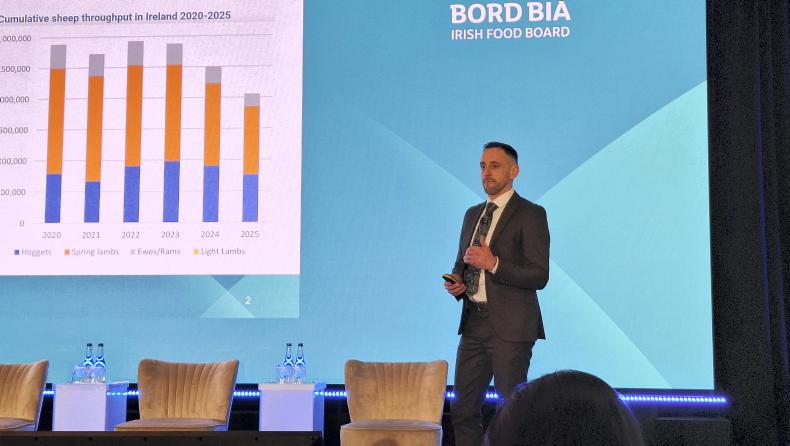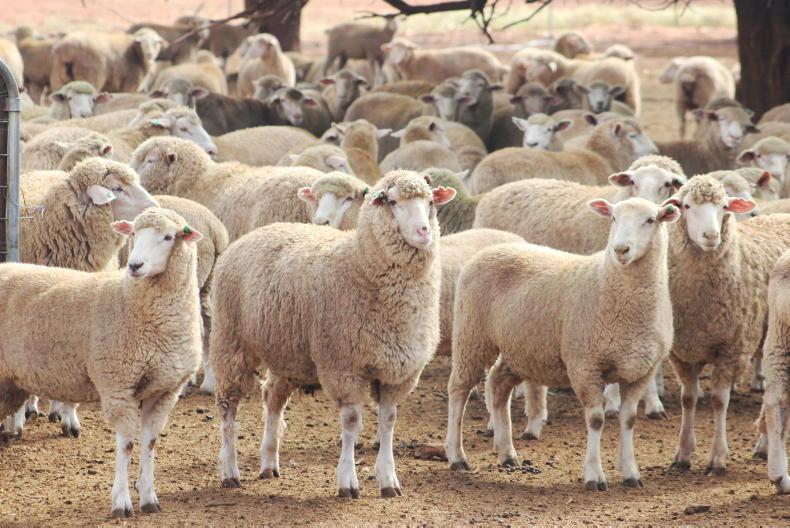The latest Bord Bia sheep price dashboard shows British hogget prices for the week of 16 March 2024 recorded at €9.24/kg (£7.91/kg), with reports indicating prices have now moved upwards of £8/kg (€9.34/kg) .
This represents an increase of €2.09/kg since the turn of the year, with farmgate returns running some €3.29/kg (£2.82/kg) higher than the corresponding period in 2023. This equates to over €75 (£64) per head higher on a 23kg hogget carcase.
As detailed in Table 1, British prices have surpassed the high prices recorded in France, with a differential of over 40c/kg now evident. The Agriculture and Horticulture Development Board (AHDB) reports that a combination of tight supplies, strong sales, higher exports and lower-than-anticipated sheepmeat imports are fuelling the higher prices.
Estimated throughput of approximately 2.27m head up to the week ending 16 March 2024, is running over 105,000 head lower than the corresponding period in 2023. The greatest reduction occurred in February, with throughput falling by 77,000, or 8%, on January levels and recorded at 909,000 head.
The reduction in throughput led to UK sheepmeat production of 21,500t falling by 1,700t when compared to January 2024. The AHDB predicts that throughput will remain tight having forecast a 10% or 430,000 head reduction in the number of hoggets carried forward to 2024.
The latest data published shows sheepmeat exports of 6,800t in January increasing by 820t on December 2023, with exports to France especially strong and increasing by 1,000t. While imports from New Zealand of 3,000t in January are running higher than January 2023, they are still lower than anticipated.
European production
Production is also running significantly lower in the main sheep-producing nations in Europe. Production fell by almost 7% on average in 2023, with output falling by almost 11% in Spain, 8% in France and 7.4% in Romania. Ireland was the only country in the seven top sheep-producing nations in the European Union to record steady output in 2023.
The latest EU Commission price update shows heavy lamb (>13kg) prices averaging €8.21/kg, an increase of 13.7% year-on-year, while light lamb (<13kg) prices of €8.08/kg are running over 15% higher. The religious festivals of Ramadan and Easter are driving current demand. As detailed in Table 1, the price increases witnessed in the UK and Ireland are running ahead of other countries, with the differential in prices paid narrowing majorly.
The average price in Spain has eased back from a high point of almost €9/kg in January. This is resulting from the sheep milk production curve, with intensively fed lambs coming onto the market.
Contrasting fortunes
New Zealand sheepmeat remains under massive pressure, with prices averaging at the equivalent of just €3.41/kg. Beef and Lamb New Zealand (similar to Bord Bia /Teagasc) is warning that sheep producers face heavy losses and that this will have long-term consequences in further reducing sheep output.
The pressure on New Zealand prices is stemming in part from record Australian production and exports. Meat and Livestock Australia (MLA) report that lamb and mutton exports in February 2024, of 52,351t, marked the highest export volume for any month on record. Red meat exports in February are running 36% higher year-on-year.
The US remains Australia’s largest lamb market, with exports increasing year-on-year by 36% to 7,543t. The strong performance of the US market casts a spotlight on Ireland’s failure to progress market access and get to a position where veterinary certificates can be finalised and sheepmeat can actually be exported. The Department of Agriculture is leading a trade mission to the US this week and, as such, a strong spotlight will be placed on sheepmeat access.
China also recorded positive upward momentum, with import volumes from Australia increasing 15% year-on-year and recorded at 5,215t.
China remains the largest market for mutton and accounted for 6,639t of overall mutton exported 21,299t (37% jump).
One would expect much higher imports from New Zealand and Australia in to the UK and European Union given the price differential, but reports indicate the respective sheep sectors are cautious to move away from markets closer to home, given ongoing shipping issues in the Suez Canal.









SHARING OPTIONS